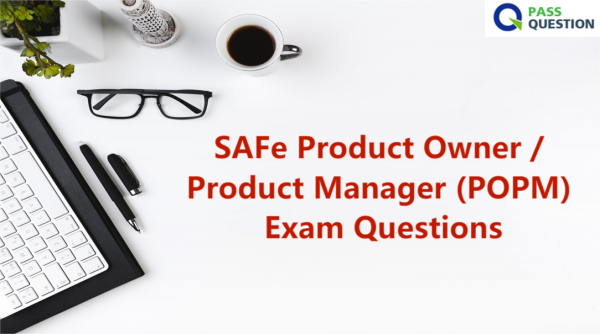SAFe Product Owner / Product Manager (POPM) Exam Questions
If you are looking for a way to advance your career as a product owner or product manager in a SAFe enterprise, you might be interested in taking the SAFe Product Owner/Product Manager (POPM) exam. To help you with your POPM exam preparation, we have created a set of SAFe Product Owner / Product Manager (POPM) Exam Questions that are based on the latest version of the exam (6.0). These questions are similar to the ones you will encounter on the actual exam, both in terms of format and difficulty. By taking our SAFe Product Owner / Product Manager (POPM) Exam Questions, you will be able to assess your strengths and weaknesses, identify your knowledge gaps, and improve your confidence and readiness for the exam.

POPM - SAFe Product Owner/Product Manager
A Certified SAFe Product Owner/Product Manager (POPM) is a SAFe professional who works with customers and development organizations to identify and write requirements. Key areas of competency include identifying customer needs, writing epics, capabilities, features, and stories, and prioritizing work in order to effectively deliver value to the enterprise.
POPM Exam Details
- POPM - SAFe Product Owner/Product Manager
- Duration: 90 minutes
- Number of questions: 45
- Passing score: 33/45 (73%)
- Question format: Multiple choice (one answer) or multiple select (2-3 answers)
- Languages offered English
POPM Exam Objectives
Becoming a Product Owner/Product Manager in the SAFe enterprise (10%)
- Describe SAFe for Lean Enterprises
- Explain Value Streams
- Describe Lean-Agile Mindset decision-making
- Describe Product Owner/ Product Manager responsibilities
Preparing for PI Planning (30%)
- Describe PI Planning
- Describe the Vision
- Forecast work through Roadmaps
- Create beneficial Features
- Manage the Program Backlog and Kanban
Leading PI Planning (20%)
- Communicate the Vision
- Establish PI Objectives
- Manage Dependencies
- Manage Risks
Executing Iterations (30%)
- Apply user stories
- Plan the Iteration
- Manage flow with Team Kanban
- Continuously refine the backlog
- Participate in the Iteration Review and Retrospective
- Support DevOps and Release on Demand
Executing the PI (10%)
- Participate in the PO Sync
- Participate in the System Demo
- Innovate Throughout the PI
- Inspect and Adapt
View Online SAFe Product Owner/Product Manager POPM Free Questions
1. Which 3 below are main considerations for all Product Management when communicating the Vision?
A. Share how many business owners are supporting the feature
B. Show how the Vision aligns with Strategic Themes
C. Share lean business case for the Epic related to the feature
D. Explain the purpose of NFRs
E. Provide user personas to explain how program vision improves customer experience
Answer: B,D,E
2. What does transparency mean in a scrum environment?
A. The process is visible to all stakeholders
B. Team members must immediately share any and all feedback with each other
C. Development and Operations teams work together
D. The team is constantly improving its process
Answer: A
3. Who is responsible for ensuring quality is built into the code in SAFe?
A. Agile Teams
B. Developers
C. Testers
D. Product Owners
Answer: A
4. Which function is responsible for ensuring that the Agile Release Train has the Program Vision and Backlog needed to successfully engage in Program Increment Planning?
A. Lean-Agile Center of Excellence
B. Release Train Engineer
C. Product Management
D. Product Owner
Answer: C
5. Which of the below actions would a Product Manager take to assess the needs of a customer?
A. Go through a Gemba walk
B. Ask for feedback after Release
C. Initiate elicitation discussions
D. Ask for input from the product governance committee
E. Conduct customer visits
F. Conduct Pl Planning sessions
Answer: A,B,E
6. Which two options are part of the SAFe Core Values? (Choose two.)
A. Program execution
B. Transparency
C. Innovation
D. Working software
E. Decentralized control
Answer: A,B
7. What are the 2 main purposes of Pl Objectives?
A. Builds credibility in the process of Pl Planning
B. Easier for the business owners to take these back to the board
C. Decentralized decision making is easier at the team level once the business values are clear for the team Pl objectives
D. immediate feedback to business owners that the team understands the desired outcomes
Answer: C,D
8. Which 3 below are features creation design thinking tools that are used by Product Managers and Product Owners?
A. Story Maps
B. Whole Product Thinking
C. Personas
D. Customer Journey Maps
E. Lean Business Case
Answer: A,C,D
- TOP 50 Exam Questions
-
Exam
All copyrights reserved 2025 PassQuestion NETWORK CO.,LIMITED. All Rights Reserved.

